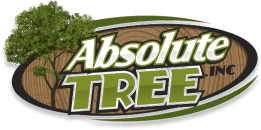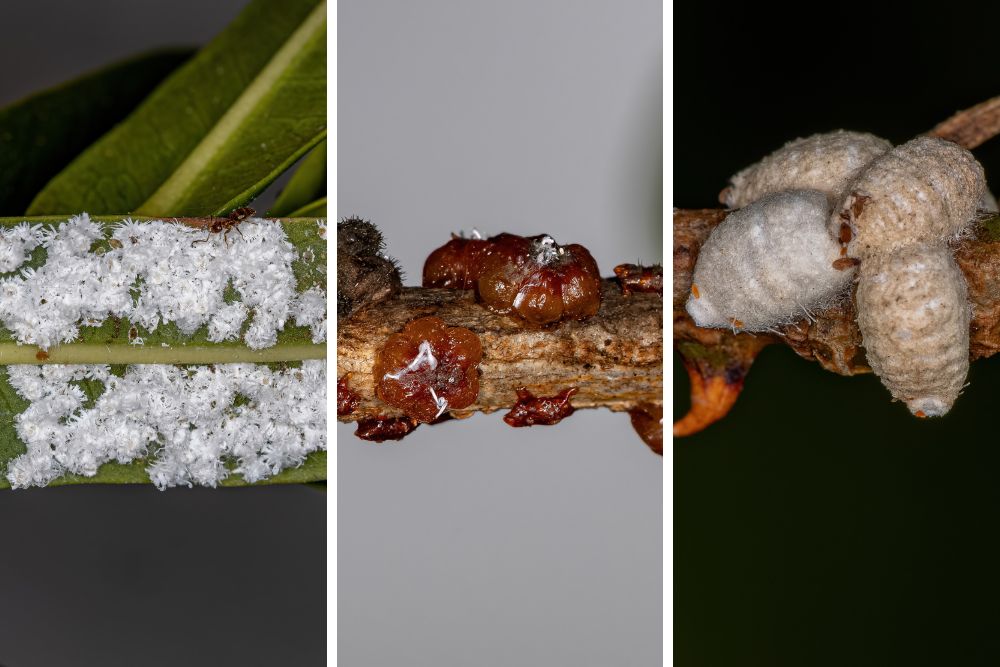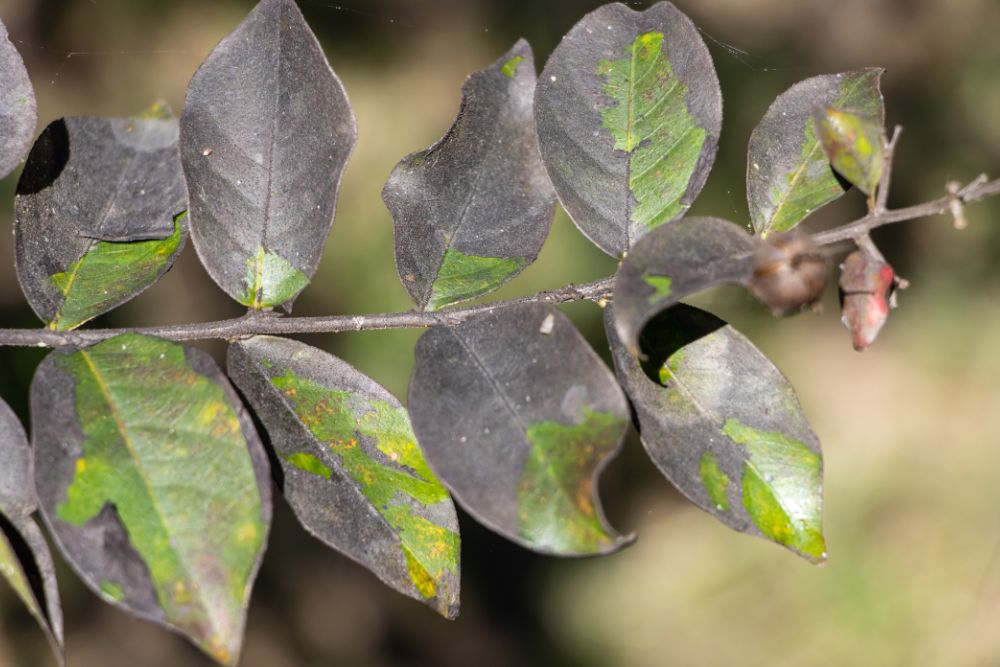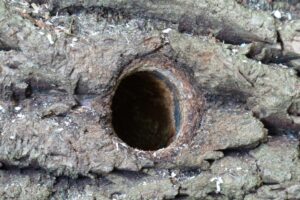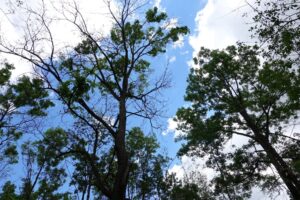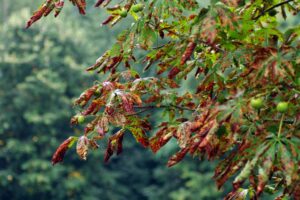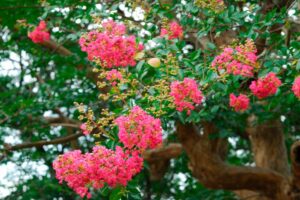In Northern Virginia, scale insects are a common pest that can affect a variety of trees. These small insects feed on tree sap, causing symptoms such as twig dieback, premature leaf drop, and stunted growth. If left untreated, scale insect infestations can be fatal to the tree. Because scale can only be effectively treated during the brief period in their lifecycle during which they’re susceptible to insecticidal treatments, it’s vital to be able to recognize the early symptoms of scale insects on trees and get professional help quickly.
Key Takeaways
- Both types of scale insects (soft and armored scale) are widespread and pose a significant threat to a broad variety of trees in Northern Virginia.
- Scale insects can cause extensive damage to trees, including stunted growth, premature leaf drop, and in severe cases, death of the tree.
- Different scales infest different tree species; it’s important to know which trees are growing in your yard so you know which symptoms of scale infestation to look for.
- Recognizing the early signs of a scale infestation is key to preventing the long-term damage these pests can inflict.
- Professional intervention by experienced arborists, such as those from Absolute Tree Service, is recommended for diagnosing and treating scale infestations to ensure the health and longevity of affected trees.
Types of Scale Insects in Northern Virginia
Scale insects are small, parasitic pests that significantly threaten trees and shrubs in Northern Virginia. Despite their diminutive size, they can have a profound impact on tree health.
There are over 150 species of scale insects in Virginia, but they can broadly be classified into two main types: soft scales and armored scales. Both types are adept at camouflaging themselves on twigs and branches, often going unnoticed until significant damage has occurred.
- Soft Scales – These scales are larger and secrete a sticky substance known as honeydew which leads to the growth of sooty mold, a black or dark grey fungus that can cover leaves and branches.
- Armored Scales – Smaller and harder, these scales do not produce honeydew but directly damage the plant by sucking out its sap. Their hard shell protects them from many insecticides, making control more challenging.
Identifying Scale Insects
The first step in understanding if your tree has been infested with scale, is to know what different scale insects look like and which trees they usually attack.
Scale insects often resemble small, immobile bumps on the stems, branches, and sometimes the leaves of trees. They can be mistaken for part of the tree’s own growth. Armored scales are typically smaller and have a hard, protective covering, while soft scales are slightly larger and may be covered in a waxy or cottony coating. Both types can vary in color, from brown or gray to white, helping them blend in with the trees they infest. Male and female scale can also look different, further complicating identification.
Q. How often should I inspect my trees for signs of scale or other pest infestations?
A. We recommend inspecting your trees at least once each season, as different pests can be active at different times of the year.
Common Armored Scale Types & Appearance in Northern Virginia
- San Jose Scale: Circular, slightly convex, smoky black scales, known for damaging a wide variety of trees and shrubs.
- Oystershell Scale: Oyster shell-shaped scales that are chestnut to dark brown in color. Infests numerous tree and shrub species.
- Pine Needle Scale: Pure white, oyster shell-shaped scales. Commonly infests ornamental pines and spruces.
- White Peach Scale: Circular white females with an orange-yellow central spot and elongated pure white males. Primarily affects stone fruits like peach and plum.
- Euonymus Scale: Pear-shaped blackish-brown females and elongated white males. Causes defoliation and dieback in evergreen euonymus and other hosts.
- Gloomy Scale: Circular, strongly convex dark gray or black scales with a light-gray central ring. Affects various tree species, especially maples.
- Obscure Scale: Dark gray scales, often blending with the bark, leading to dieback in oaks and other trees.
- Juniper Scale: Round dirty white females with yellow centers and smaller, narrower white males. Affects junipers and related species.
- Japanese Scale: Grayish white, long, narrow scales. Attacks maples, privet, boxwood, holly, and other plants.
Common Soft Scale Types & Appearance in Northern Virginia
- Magnolia Scale: The largest soft scale insect, up to 1/2 inch, varies from dark brown to pink-orange with a white waxy powder covering older scales. It produces honeydew attracting wasps and ants.
- Tuliptree Scale: The second largest scale (up to 1/3 inch) with color ranging from gray-green to pink-orange without the white waxy powder. Attacks tulip trees and magnolias.
- European Fruit Lecanium: Small, oval, very convex scales, about 1/8 inch long with color varying from brown to reddish-brown. Infests a broad range of trees and shrubs.
- Oak Lecanium: Similar to European fruit lecanium in appearance. Favors oak but also affects hickory and birch.
- Fletcher Scale: Shiny, dark brown, very convex scales that resemble the European fruit and oak lecaniums. Typically infest arborvitae and yew.
- Pine Tortoise Scale: Reddish-brown with dark spots, resembles miniature tortoise shells. Infests various pine species.
- Cottony Camellia Scale, Cottony Taxus Scale: Notable for their long, white, cottony egg sacs. Found on a variety of host plants (including camellia and yew), with one generation per year.
- Cottony Maple Scale: Produces large, white egg sacs that look like small cotton balls on twigs and branches. Commonly found on silver maple among other trees, with one generation per year.
- Cottony Maple Leaf Scale: Similar egg sacs to the cottony maple scale but produced on the leaves, affects multiple tree species.
The species of scale insects that are prevalent in Northern Virginia attack a wide range of trees, such as holly, many evergreens and conifers, maples, beeches, birches, oaks, and crepe myrtles. Each scale species prefers different host trees, making it important to know what types of trees you have on your property so you’ll know which types of scale insects to look out for.
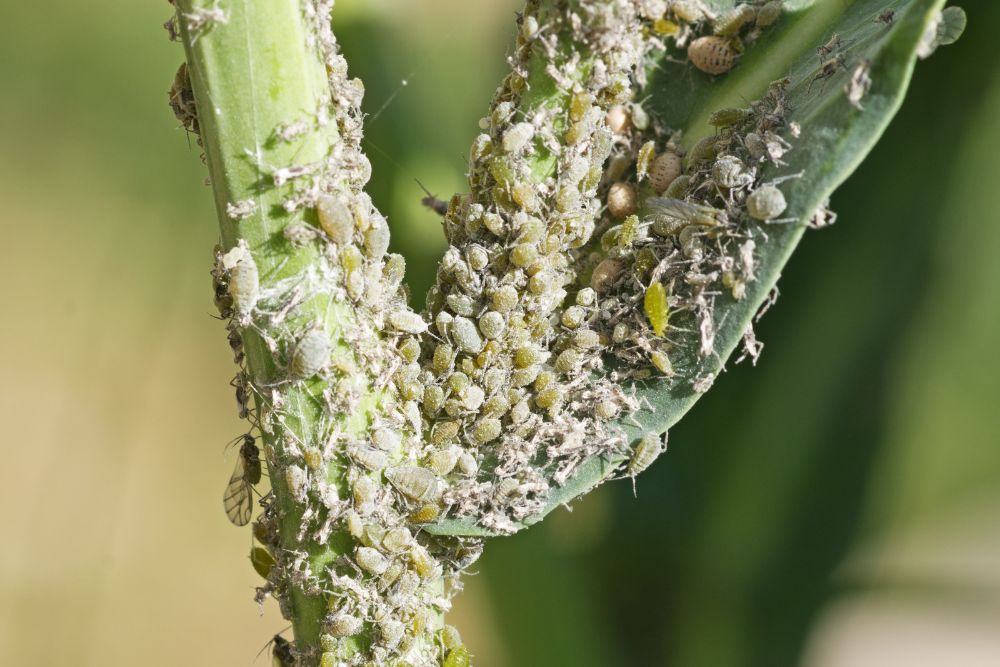
Sticky honeydew residue on a branch could be evidence of soft-scale activity that can attract other pests and lead to sooty mold growth.
Identifying the Symptoms of Scale Insects on Trees
Scale insects feed on tree sap, using their piercing mouthparts to suck out nutrients from leaves, twigs, and branches. This feeding weakens the tree and can lead to twig dieback, premature leaf drop, stunted growth, and in severe cases, the tree’s death. The damage caused by scale insects is not always immediate but can have significant long-term impacts on the health and appearance of trees.
The presence of scales can also attract other pests and diseases to the weakened tree, compounding the problem. Furthermore, the honeydew secreted by soft scales can lead to the growth of sooty mold, which, while not directly harmful to the tree, can block sunlight and interfere with photosynthesis, further weakening the plant.
Recognizing the presence of scale insects on trees and shrubs is the first step towards mitigating their impact. Look for these signs and symptoms that can alert you to their presence.
1. Scale Insects Visible on Branches
If branches look like they’re covered with small bumps, take a closer look. Try scraping some off with a twig, your fingernail, or something else that won’t damage the bark. If it’s a dead scale bug, it’ll be easy to scrape off (although armored scales are a little more difficult to remove). If you can’t easily scrape it off, try squashing it; if it’s dry and crunchy, it’s dead; if it’s wet and squishy, you have a live scale.
2. Yellowing or Browning Leaves
One of the earliest signs of scale infestation is the discoloration of leaves. Infested trees may exhibit leaves that prematurely turn yellow or brown without the presence of other typical symptoms like spots or blight. This discoloration results from the loss of sap, which deprives the leaves of necessary nutrients and water.
3. Premature Leaf Drop
A tree’s canopy may begin to thin due to leaf drop and branch dieback caused by scale infestations. This thinning can lead to reduced vigor and vitality of the tree, making it more susceptible to other stresses and pests.
4. Twig and Branch Dieback
As scale insects continue to feed on a tree, they can cause significant damage to twigs and branches, leading to dieback. This symptom manifests as branches that begin to die from the tips backward, often resulting in bare branches that can affect the tree’s overall health and aesthetic.
5. Sticky, Shiny Substance on Leaves, Branches & Beneath the Tree
One of the most noticeable symptoms of soft scale infestation is the presence of a sticky, shiny substance known as honeydew. This byproduct is a direct result of the scale insects’ feeding process. As soft scales consume the sap from the tree, they excrete excess sugars in the form of honeydew. This substance coats the leaves, branches, and even the ground beneath the affected tree, creating a glossy, sticky layer that can be quite conspicuous.
6. Increased Presence of Ants, Bees, Wasps & Flies Around the Tree
Honeydew serves as a rich food source for many insects, such as ants and wasps. The appearance of ants or a large number of wasps on a tree is often one of the first visible signs of a soft scale infestation, as they are drawn to the sweet, sticky honeydew. While ants themselves do not harm the tree directly, their presence can indicate an underlying pest problem that needs attention.
7. Sooty Mold
A clear indicator of a soft scale infestation is the development of sooty mold. This black or dark grey, soot-like fungus grows on the honeydew secreted by the insects. While sooty mold does not directly harm the tree, it blocks sunlight, inhibiting photosynthesis and further weakening the plant.
8. Slower or Stunted Tree Growth
Severe scale infestations can lead to significant stress on the tree, affecting its overall health and growth. These pests extract vital nutrients from the tree’s sap, depriving the tree of essential resources needed for healthy growth. Combined with branch dieback, leaf drop, and sooty mold, infested trees aren’t able to produce enough energy through photosynthesis, leading to slower or stunted growth.
9. Decreased Fruit Production
Scale insects can affect fruit production by weakening the tree and damaging the bark and leaves, which can reduce yield and fruit quality.
Recognizing these symptoms early is critical for the health of your trees. Scale infestations can progress quickly, and the sooner they are addressed, the better the chances of saving the affected trees and preventing further damage.
Protect Your Trees: Take Action Against Scale Infestations
If you’ve noticed any signs of scale insect infestation on your trees—whether it’s the sticky honeydew of soft scales, the protective shells of armored scales, or the unwelcome presence of sooty mold—it’s time to take decisive action.
At Absolute Tree Service, we understand the unique challenges that scale insects pose to trees in Northern Virginia. Our team of experienced arborists is equipped with the knowledge and tools necessary to identify the specific type of scale insects affecting your trees and determine the most effective treatment methods. We provide personalized solutions tailored to the unique needs of your trees and property, ensuring the best outcomes for their health and appearance. Beyond treating current scale infestations, we offer advice and services to prevent future outbreaks, keeping your trees vibrant and thriving.
Don’t let scale insects compromise the health and beauty of your trees. If you suspect your trees might be infested with scale insects, or if you simply want to ensure they remain healthy and scale-free, call Absolute Tree Service today at 703-969-6207.
For the Absolute Best Tree Service in Northern Virginia, call Absolute Tree Today!
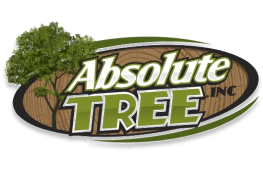
Author Profile: Ashley Davis
Over the last 19 years, Absolute Tree has grown a reputation as one of the premier tree service companies in the Northern Virginia areas. And there’s a good reason for this—we love trees and our passion for them shows. When you call on Absolute Tree for tree service, you aren’t just getting “some guys who cut down trees.” You’re hiring highly skilled arborists who understand the growth of trees and consider tree care an art form.
Stay Up-to-date!
Swing in each month for new articles, pest alerts, local resources, tree care tips, tree health updates, and landscape maintenance ideas
